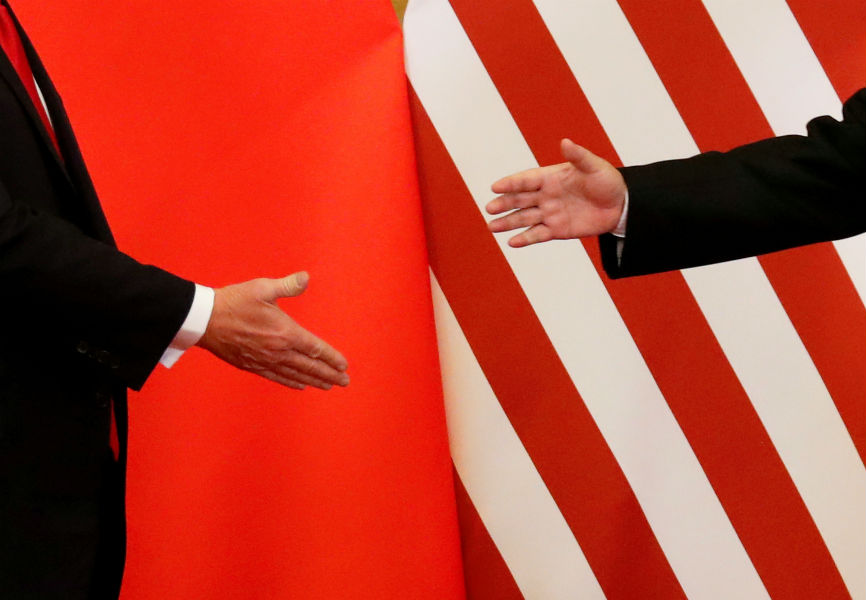The main show in the US-China trade battle has begun. President Donald Trump
recently stopped Chinese telecom giant Huawei from selling into the US market and is in the process of ceasing or limiting US firms' sales to Huawei.
Competition between Beijing and Washington for supremacy in advanced technology is now in full swing.
It is this new tech cold war, more than the trade logjam that's currently dominating headlines, that will
threaten global prosperity and stability for decades to come. While there's still time, a coalition of committed nations and companies should establish a new forum to manage the coming struggle over advanced technology.
We recently met a wide array of Chinese officials and academics in Beijing. Most of them felt strongly that managing the technology competition was the most important bilateral challenge. And they were eager to join US experts in finding solutions.
The US and China will increasingly compete over prowess in artificial intelligence, robotics, quantum computing, 5G communications as well as other technologies. Already, both sides are seeking advantage by limiting the export of know-how to each other and tightening restrictions on investment in their sensitive sectors.
The prize is power in tomorrow's international system.
Control of the international marketplace is at stake, as advanced technology will run the global economy. Tech supply chains will anchor future alliances. Also, leadership in technology will give an edge on the national security front.
The Trump administration holds that the US innovation base and its military applications are central to protecting the country's future security. Chinese leaders, similarly, believe that civilian technological advances go hand-in-glove with leaps in the military sphere.
The Huawei episode shows that the future is upon us. The US hit Huawei because of fears the Chinese government could use the company to penetrate and disrupt global telecommunications. That would undermine US national security.
Also, the US seeks preeminence for its firms in 5G technology and is resisting efforts by Beijing to help Chinese firms take the lead. The US's decision to allow some sales for 90 days is likely only a stay of execution, as the underlying concerns persist.
The tariff war will spike this tech competition. The adverse context and atmospherics from that battle will speed and deepen the long-term tech confrontation. For example, the recent US tariff hike on $200 billion (S$275 billion) worth of Chinese goods from 10% to 25% will speed decoupling (less interaction) between the US and Chinese economies—giving each side less reason to cooperate on technology.
Like-minded nations, drawing on the expertise of relevant companies, should establish a new forum to manage competition in advanced technologies. The effort could be led by the United Nations, with backing from the European Union, as support for this effort would likely be strong in both organizations.
China might initially resist any "infringement on sovereignty," but based on what we heard recently from Chinese elites, Beijing would probably, over time, join the effort. The Trump administration would be instinctually opposed to any new institution, but international suasion could ease the US stance.
This forum should develop norms to govern policy. States should not pursue linkages between artificial intelligence and weapons, as this nexus risks the catastrophic loss of human control over weaponry. Nations should not pursue the use of quantum computing to break other states' ability to encrypt. The ability to protect messages and data is necessary for nations to feel secure.
Reduction of intellectual property theft for commercial gain will also be an important goal, as the practice stokes mistrust between states. Finally, states need to work toward a shared concept of when a technology is national security relevant—one that is not overly expansive. Nations need to curb the practice of restricting technology flows on security grounds, lest all cooperation on tech advances falls by the wayside. Too many "Huawei episodes" would slow innovation.
After building consensus on norms, nation-states should create a new institution with the power to enforce them and govern tech competition. A UN-led international coalition should exert strong pressure on all states to join the body, decision-making should occur by vote, and observance of approved norms should be mandatory.
The institution would police rules against illicit behavior. It would have inspection rights for suspect sites if it has compelling evidence that a nation is violating agreed norms. A punishment regime involving sanctions would be available to use against violators.
This is strong medicine. But the real threat from US-China relations, competition over advanced technology, is a virulent danger to global stability.
This article originally appeared in The Straits Times.

 US President Donald Trump and Chinese President Xi Jinping shake hands. REUTERS.
US President Donald Trump and Chinese President Xi Jinping shake hands. REUTERS.